|
|
|
Sort Order |
|
|
|
Items / Page
|
|
|
|
|
|
|
| Srl | Item |
| 1 |
ID:
177499


|
|
|
|
|
| Summary/Abstract |
This study provides empirical evidence on the association between board attributes and corporate social responsibility (CSR) engagement—as well as between CSR engagement and corporate performance—in the global energy sector. The data for the period of 2011–2018 was obtained from Thomson Reuters. The results indicate that board diligence and CSR committees are robust drivers of CSR performance, as proxied by the composite environmental, social, and governance (ESG) score along with its three individual indicators. While board independence is more influential in boosting the aggregate ESG score and the governance indicator, the board's gender diversity is more influential in environmental and governance indicators. However, higher CSR performance does not guarantee higher financial performance—as proxied by both market and accounting performance. We provide theoretical and practical implications, to guide regulators and energy firms in ensuring the sustainable development of the sector.
|
|
|
|
|
|
|
|
|
|
|
|
|
|
|
|
| 2 |
ID:
143423
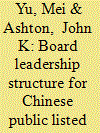

|
|
|
|
|
| Summary/Abstract |
It is widely accepted that board leadership structure and whether the chairperson and CEO roles should be undertaken jointly or separately affects the performance of a firm. Despite this consensus, empirical evidence presents major uncertainties as to the direction and degree of this influence. This study contributes to this debate by examining the relationship between board leadership structure and firm performance and the expense ratio, using propensity-score matching methods for Chinese PLCs from 2003–2010. It is reported that whilst CEO duality is not related to companies' profitability ratios, it is linked to a higher expense ratio compared to matched companies with a separate board leadership structure. This indicates that a separate board leadership structure is an effective corporate governance arrangement to reduce agency costs for Chinese PLCs.
|
|
|
|
|
|
|
|
|
|
|
|
|
|
|
|
| 3 |
ID:
157062


|
|
|
|
|
| Summary/Abstract |
How does institutional quality affect firm performance? We examine the effect of various measures of institutions on firm productivity, using a rich micro level data on manufacturing enterprises in India drawn from the Enterprise Surveys of the World Bank. Our results suggest that bureaucratic corruption negatively influences firm productivity. In contrast, other institutional variables seem to have less influence on firm performance. This suggests that the focus of the Indian government needs to be redirected to address the corrupt practices at various levels rather than focusing just on improving the measures of doing business.
|
|
|
|
|
|
|
|
|
|
|
|
|
|
|
|
| 4 |
ID:
193052


|
|
|
|
|
| Summary/Abstract |
Empirical investigation finds that firm-specific factors, namely deleveraging of balance sheets, comfortable cash flows and improving debt servicing capacity impact fixed investment in private corporate sector positively. Monetary policy impacts fixed assets investment growth of financially constrained firms more compared to non-financially constrained firms. Furthermore, the impact of COVID pandemic on investment was more adverse in case of weak firms.
|
|
|
|
|
|
|
|
|
|
|
|
|
|
|
|
| 5 |
ID:
173747
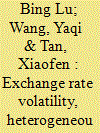

|
|
|
|
|
| Summary/Abstract |
With the gradual promotion of market‐oriented reform of the RMB exchange rate, the fluctuation range of the RMB exchange rate is increasing. How to deal with the impact of exchange rate volatility on Chinese exports is an important challenge faced by China. This paper finds that although exchange rate volatility, as a whole, has a negative impact on exports, high‐productivity exporters are less prone to exchange rate volatility shock in both intensive and extensive margins. As high‐productivity firms are less affected by exchange rate risk, they account for larger market shares. This paper, from a new perspective, provides evidence that increasing productivity helps mitigate the negative impact of exchange volatility on exports.
|
|
|
|
|
|
|
|
|
|
|
|
|
|
|
|
| 6 |
ID:
173877


|
|
|
|
|
| Summary/Abstract |
This study explores the influence of corporate governance practices in corporate boards on firm performance and draws insights on the relative importance for companies for fostering the development of governance mechanisms in business. The study examines 50 firms belonging to the benchmark index of the National Stock Exchange of India (NIFTY 50) and tracks them for over a five-year period. The study uses fixed and random effect econometric models to explore the relationship between corporate governance variables, and firm performance using both accounting returns (EVA, ROA and ROE) and market returns (MVA). The study finds that corporate governance variables significantly improve firm performance or value creation. Especially, multiple directorships, involvement of foreign institutional investors and increase in promoter holdings may significantly affect returns of the firm. The study suggests that it may be useful to foster better corporate governance practices and monitor linkages with firm performance as the effect is influenced by other control variables also.
|
|
|
|
|
|
|
|
|
|
|
|
|
|
|
|
| 7 |
ID:
184055


|
|
|
|
|
| Summary/Abstract |
This paper studies the effects of legal reforms associated with defence and public procurement on firm performance. With this aim, a theoretical framework for the reaction of defence firms to regulatory changes is developed. Its predictions have been empirically assessed using the last reforms implemented in Spain. Our results suggest that these new regulations have allowed the main defence contractors to outperform the other defence contractors in terms of productivity, having no effect on profitability. These findings are in line with theoretical priors. Therefore, it can be claimed that governmental interventions have had an effect on firm performance. We also provide evidence that, while the procurement procedures and the contract law put into place in 2011 have principally affected the productivity of large firms, the centralization process established in 2014 has exerted a higher influence on SMEs.
|
|
|
|
|
|
|
|
|
|
|
|
|
|
|
|
| 8 |
ID:
181472
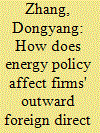

|
|
|
|
|
| Summary/Abstract |
Energy policy can improve the efficiency of firms' outward foreign direct investment (OFDI) and promote the quality of China's economic growth, which is an important issue requiring urgent attention from Chinese society. Using the data of A-share listed companies from 2007 to 2018, this paper examines the impacts and mechanisms of both new and traditional energy policies on firms' OFDI. First, this study found a significant positive promotion effect from energy policy on firms' OFDI. Second, the heterogeneity test results suggest that an increase in the level of urban openness may weaken the positive effect of new energy policies on firms' OFDI, but may enhance the promotion effect of traditional energy policies. State ownership is conducive to enhancing firms' OFDI under new energy policies. However, such ownership can weaken the willingness of firms to invest abroad under traditional energy policies. Third, the mechanism analysis shows that new energy policy promotes firms to invest in technologically developed host countries, thus expanding the scale of firms' OFDI in the next round. Energy policies can improve firms' business and environmental performances in the short run; in the long run, this effect diminishes year by year.
|
|
|
|
|
|
|
|
|
|
|
|
|
|
|
|
| 9 |
ID:
185702


|
|
|
|
|
| Summary/Abstract |
Decarbonisation implies conversion to electrification with a subsequent increase in electricity consumption. The EU Emission Trading System (EU ETS) compensates firms for the higher electricity costs. We exploit sectoral and country differences in regulation and a unique dataset on beneficiaries to evaluate the impact of EU ETS indirect cost compensation on the performance of aided firms. Receiving compensation for indirect costs does not have a statistically significant impact on labour productivity. Conversely, there is evidence of a negative performance in terms of turnover, value of total assets and employment of beneficiaries. Results suggest that the amounts transferred to firms might not fully compensate for the higher cost of energy in aided countries. However, the negative effects fade in sectors more exposed to carbon leakage risk. As far as aid intensity is concerned, estimates imply that higher compensation amounts improve performance.
|
|
|
|
|
|
|
|
|
|
|
|
|
|
|
|
| 10 |
ID:
133198
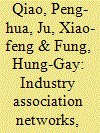

|
|
|
|
|
| Publication |
2014.
|
| Summary/Abstract |
This study uses panel data analysis to examine the effects of membership in industry association networks on innovation and firm performance in Chinese small and medium-sized enterprises (SMEs) listed on the Shenzhen Stock Exchange Small and Medium-size Enterprises Board from 2007 to 2011. There are several interesting findings. First, research and development (R&D) and technology staff have a positive and significant effect on innovation at SMEs. Second, participation in industry association networks (defined as comprising business association networks and technology association networks) can improve firm innovation at Chinese SMEs. Third, innovation is found to have a positive effect on firm performance at SMEs. Finally, membership in industry association networks can improve firm efficiency and increase non-operating income but at the expense of higher management costs at SMEs. Our study has important policy implications for policymakers and SMEs in China.
|
|
|
|
|
|
|
|
|
|
|
|
|
|
|
|
| 11 |
ID:
143357
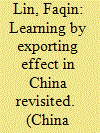

|
|
|
|
|
| Summary/Abstract |
Does exporting increase the firm’s productivity causally? Focusing on Chinese exporters over the period 1998-2007, we construct a new measure of firm-specific trade cost, based on the daily Baltic Dry Index (BDI), as an instrument of exports. The BDI is termed a leading trade cost indicator, reflecting the cost of utilizing dry bulk carriers which primarily consists of materials that function as raw material inputs to the production of finished goods. We find that a one percentage point expansion in exports raises firm total factor productivity by approximately 0.04 percentage point on average, which accounts for nearly 60 percent growth of the exporter’s productivity over the period 1999-2007
|
|
|
|
|
|
|
|
|
|
|
|
|
|
|
|
| 12 |
ID:
158553
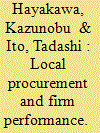

|
|
|
|
|
| Summary/Abstract |
This paper examines the impact of local procurement on the performance of foreign-owned firms. Using a unique survey of Japanese overseas affiliates suitable to this end, the authors show that the increase of local procurement improves Japanese affiliates’ performance, but these positive effects are observed only in the case of procuring inputs from other Japanese affiliates in their host country, not in the case of procurement from indigenous firms.
|
|
|
|
|
|
|
|
|
|
|
|
|
|
|
|
| 13 |
ID:
156424
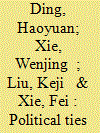

|
|
|
|
|
| Summary/Abstract |
Whether political ties enhance or weaken firm performance has been widely investigated in a number of studies, including some on China. Based on a database of non-financial A-share listed firms from 2004 to 2012, we study the effects of political ties on firm performance within a quantile regression framework. We find that there is a positive relationship between political ties and economic performance, but that it is diminishing with respect to firm performance. Political ties appear particularly important for weaker firms.
|
|
|
|
|
|
|
|
|
|
|
|
|
|
|
|
| 14 |
ID:
105279


|
|
|
|
|
| Publication |
2011.
|
| Summary/Abstract |
This paper considers evidence on business group productivity performance in China. It also carries out a detailed investigation into China's 50 largest groups to see if pyramidal groups are forming. As such, we further explore what can be considered as some of the positive and negative attributes of Chinese groups. We show that although improvements in productivity have taken place, some Chinese business groups are also taking the first steps towards developing pyramidal structures. This could have important implications for longer-term productivity growth in China's business groups.
|
|
|
|
|
|
|
|
|
|
|
|
|
|
|
|
|
|
|
|
|